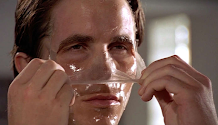After speaking my my buddy John of the film and it's plot, he asked about the parallels with the movie Joker. I acknowledged how I there were parallels in the characterization, but that I was knowingly pulling more from Last Night in Soho, American Psycho, and Se7en. Last Night in Soho involves a main character, Eloise, who begins to mirror aspects of of life after a performer from the 1960s, Sandie. American Psycho since for it's main character, Patrick Bateman, is void of expression and emotion (at least when he's not killing or being insane). And Se7en, mostly because of it's line about Envy towards the end of the film.
Regardless, we then had a conversation in which neither of us could remember the exact reason behind why the Joker went on the Murrey Show; I believe it was out of a revenge plot while John believed it was because he wanted to be on the show, but neither of us were really sure. Just from collection though, I thought the story would share more elements with The King of Comedy than Joker, so that brings us here.
THE KING OF COMEDY
The movie follow Rupert Pupkin, who desperately wants his big break in show business as a comedian. While he's inspired by a talk show host, Jerry Langford, he doesn't want to be him; Rupert would rather have a spot on his show than be him. Rupert resembles a psychopath for his lack of empathy for others in his actions, he cares only for his personal gain and delusions of grandeur. He can't even process criticism towards himself; the closest he comes is telling Langford that he is jealous of Rupert's talents.
Rupert is a narcissist and has motivation for his actions, this is different to Eric who would be shown as an ignorant character who watches TV to learn how to behave. It's only towards the end of the film that Eric would begin to show any of his own emotions in his fear.
JOKER
Now when it was released, Joker received many comments about it's heavy inspiration from film like Taxi Driver and the aforementioned King of Comedy (the inclusion of Robert De Niro basically confirms it). Anyhow, in the film Joker is shown multiple times to imagine scenarios such as forming a relationship with his neighbor and having a conversation with Murray after he noticed as an audience member. So when compared to the very early ideas I had where Eric would see himself in the shows he'd watch, but in my film Eric isn't necessarily seeing himself in the show; Eric and the Host would actually be more similar to Joker and his neighbor.
Through the imagined scene of Joker talking with Murray, the viewer sees how Joker projects his beliefs when Murray says he'd love to have him as a son. Later when Joker confronts Thomas Wayne, he explains that he doesn't want money or pity, but instead just time together where he feels accepted. Joker also explains in the movie how he feels no one notices him, but when he does starts to get attention he likes it. Joker's desire for finding inner peace in a chaotic world differs from Eric's need to mimic what he watches to gain a sense of social satisfaction. Murray's character would also differ in the sense that he would invite Joker to the show, where as the Host in my short film wouldn't dare consider Eric to be on his show or allow him to mimic him. And yes, Murray invites Joker to the show to make fun of him, but he at least acknowledges his existence where as the Host in the the short film simple hates Eric.
Even if the two films differ to the story I have in mind, it was still cool seeing similar elements play out differently. Thanks John!








No comments:
Post a Comment